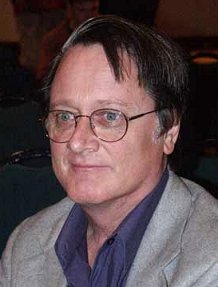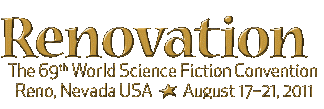Guest of Honor - Tim Powers

Tim has used his lifelong love of history to imbue his fiction with a strong sense of time, place and the fantastic. Along with his old friends James Blaylock and K. W. Jeter, he helped develop the notion of steampunk (think Jules Verne and H. G. Wells on steroids). As reviewer and ardent history buff Jim Mann has observed:
Powers has the remarkable ability to look at disparate parts of real history, examine them for where things are not quite explained or are just about strange, and weave a compelling “secret history” of what was really going on. It's impressive not only in that he does it in a way which seems consistent with the real history we know, but in a way in which while we read, we accept the supernatural underpinnings he creates. Moreover, science fiction and fantasy fans are prone to talk of sense of wonder and the feeling it invokes: Powers manages to take often rather mundane history ... and overlay it with remarkable moments of sense of wonder.
Tim Powers graduated from California State University at Fullerton with a B.A. in English in 1976; the same year saw the publication of his first two novels, The Skies Discrowned and Epitaph in Rust (both from Laser Books).
Tim's subsequent novels are The Drawing of the Dark (Del Rey, 1979), The Anubis Gates (Ace, 1983, winner of the Philip K. Dick Memorial Award and the Prix Apollo), Dinner at Deviant's Palace (Ace, 1985, winner of the Philip K. Dick Memorial Award), On Stranger Tides (Ace, 1987), The Stress of Her Regard (Ace, 1989, winner of the Mythopoeic Award), Last Call (Morrow, 1992, winner of the World Fantasy Award), Expiration Date (Tor, 1996), Earthquake Weather (Tor, 1997), Declare (Morrow, 2001, winner of the World Fantasy Award), and Three Days to Never (Morrow, 2006). He is also the author of a collection of short stories, Strange Itineraries (Tachyon, 2005).
Tim Powers has taught at the Clarion Science Fiction Writers' Workshop at Michigan State University six times, and has for many years co-taught the Writers of the Future Workshop.
Tim's website can be found at www.theworksoftimpowers.com.
An Interview with Tim Powers
The following interview with Tim Powers was conducted for Renovation Progress Report 1 by Laurie Mann of the Renovation program division.
| Renovation: | Were you interested in the Cold War and espionage before you wrote Declare? |
| Tim Powers: | Yes, I'm a long-time fan of Ian Fleming and John le Carré, and I had always thought that it would be fun to use the cool devices of espionage fiction codes, clandestine meetings, doubled and redoubled agents, secret purposes! And then I read a non-fiction book about the spy Kim Philby, who was head of counter-espionage for the British Secret Service but who turned out to have been working for Moscow all along, and Philby's biography had a lot of the mysterious and unexplained elements that (to me) seem to call for a supernatural explanation! |
| Renovation: | Did you learn anything in researching Declare that you didn't expect? |
| Tim Powers: | Well yes, but I hadn't really known a lot about the Cold War to begin with, it turns out. I hadn't realized that Berlin was way inside East Germany, for instance I had somehow got the idea that it was on the border, so that if you got over the wall you were in free territory. And I didn't know anything about Arabs, specifically Bedouins, and their culture, which turned out to be fascinating. And writing the book was an excuse to read the whole Thousand Nights and One Nights (the Burton translation). Obviously it was high time I did this research! |
| Renovation: | [Along with James Blaylock, Tim created a Victorian poet named William Ashbless. Ashbless has published poetry and a cookbook. He has something of a web presence, including a Facebook page.] Do you expect to publish more as Ashbless in the future? |
| Tim Powers: | Oh, probably! Blaylock and I have been doing William Ashbless projects ever since we were in college in 1972, and I can imagine us publishing a collection of his poems on car repair, for instance, or transcripts of his trials in small-claims courts having to do with disputes over furniture and rent. Someone should eventually make a movie of his tawdry adventures, so that he can provide for Blaylock and I in our declining years, which may already have begun. |
| Renovation: | What can you tell us about Pirates of the Caribbean: On Stranger Tides? |
| Tim Powers: | Not much! Disney began optioning my novel almost three years ago, in case they did a fourth Pirates of the Caribbean movie, so I was cautiously pleased when the second and third movies did well at the box office and I've been looking at all the movie blogs to see what the rumors about the fourth movie are, but aside from the option contract I've had no contact with anybody involved in the movie. |
| Renovation: | What are you working on now? |
| Tim Powers: | I'm in the middle of a novel that takes place in Victorian London, with lots of supernatural stuff going on. |
| Renovation: | Of the books you've written, what is your favorite? |
| Tim Powers: | That would be hard to say! I'm fond of each of them in one way or another. But I guess if I had to pick a favorite right now, it would be -- let's say Last Call. It was the first time I was able to actually visit the place I was setting a book in, and Las Vegas and poker turned out to be a lot of fun to write about. And in fact the Las Vegas I wrote about is largely gone now, so I'm glad I made some record of the place as it was! |
| Renovation: | Which of your books do you think has been the most influential? |
| Tim Powers: | To the extent that any of them may have been influential, I suppose I'd nominate The Anubis Gates. It gets mentioned a lot as an early steampunk novel, so ideally people writing steampunk feel obligated to look at it! |
| Renovation: | What books/authors were the most influential for you when you were growing up? |
| Tim Powers: | Before I discovered science fiction and fantasy, Rafael Sabatini was a favorite, and I still always want to get some of his bravura style into my fiction. And then along came Heinlein, and he was the gateway to ... Sturgeon, Leiber, Brackett, Howard, Lovecraft! I still re-read all of them, and try to figure out how they got their splendid effects. Of them all, I guess Fritz Leiber is the writer who I most try to emulate. And in college I got interested in more mainstream writers, and so now I also try to steal effects from writers like Robert Louis Stevenson, Kingsley Amis, John D. MacDonald, and Dick Francis. |
| Renovation: | Which newer writers do you especially enjoy? |
| Tim Powers: | I'm afraid I really haven't kept up with science fiction and fantasy! Before 1975 I had read everything, from Otis Adelbert Kline and Stanley Weinbaum to Zelazny and Moorcock, but since then it's been very spotty. My (admittedly ill-informed) nomination for best currently-working writer is probably Kelly Link, whose work I think will be in print for a hundred years. |
| Renovation: | Are you currently teaching? |
| Tim Powers: | Yes, I'm currently teaching one class a week at the Orange County High School of the Arts. Jim Blaylock is my boss, and in the Creative Writing Department we encourage the students to go on to professional sales, and ideally even careers -- the ceiling of our main classroom (the basement of what was once a church) is plastered with rejection slips the students get, and some of them have got acceptance letters too. |
| Renovation: | What's the difference between teaching high school students and college students? |
| Tim Powers: | Well, I'm not getting typical high school students -- they have to send samples of their writing, and we get to select the best of a number of applicants. So I find the high school students -- these high school students! -- more well-read and eager to learn about everything than most of the college students I've taught over the years. And in general I think there's an open-mindedness to high school students that changes to an affectation of worldly cynicism in college. |
| Renovation: | Renovation concluded the interview with the question that has launched a thousand flame wars: Mac or Windows? |
| Tim Powers: | My first computer was an IBM - running Wordstar, back in the DOS command days - and so I've stuck with PCs ever since and I can't imagine not using Windows. |






